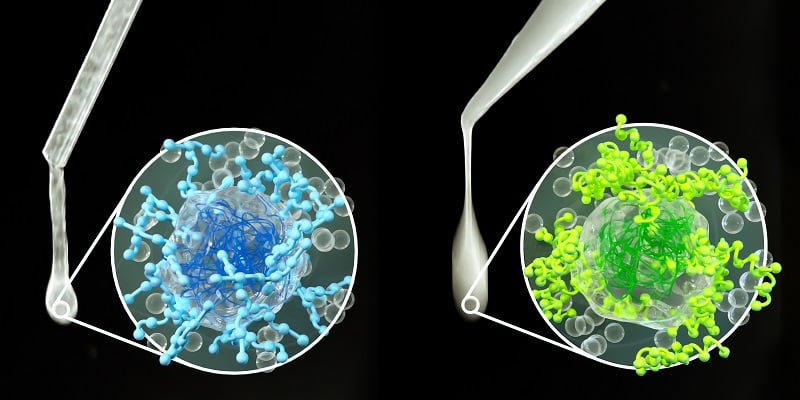Dry mouth, or xerostomia, is a prevalent condition affecting approximately one in ten individuals. It is widespread among older adults and those undergoing cancer treatment or managing multiple medications. Severe cases of dry mouth can lead to discomfort while swallowing, malnutrition, and dental problems, imposing an additional strain on healthcare systems.
According to lab tests, a new mouth lubricant created by scientists at the University of Leeds is up to five times more effective than current products. This novel aqueous lubricant, designed for dry mouth, mimics natural saliva in hydrating the mouth and aiding in chewing. Under a microscope, the substance’s molecules form a lattice-like network, binding to the mouth’s surface. The microgel is surrounded by a hydrogel that traps water, keeping the mouth hydrated for an extended period.
Professor Anwesha Sarkar, from the School of Food Science and Nutrition, who has led the development of the saliva substitute, said: “Our laboratory benchmarking reveals that this substance will have a longer-lasting effect. T” The problem with many of the existing commercial products is they are only effective for short periods because they do not bind to the mouth’s surface, with people having to reapply the substance, sometimes while talking or eating frequently. “T” affects people’s quality of life.”
Lab tests comparing a new mouth lubricant to commercial saliva substitutes are detailed in Scientific Reports. The improved performance of the unknown substance is attributed to adsorption, where molecules in the oil bind to the mouth’s surface, making it more effective than existing products.
The new substance underwent testing against eight saliva substitutes, including popular brands like Biotene and Oralieve, on an artificial tongue-like surface in a lab setting. Unlike the other products, the Leeds-developed lubricant showed lower desorption, meaning less fat was lost from the synthetic tongue. Commercial options lost between 23% and 58%, while the Leeds substitute lost only 7%, with the dairy version slightly outperforming the vegan variant.

Dr. Olivia Pabois, a Research Fellow at Leeds and first author of the paper, said: “The test results provide a robust proof of concept that our material is likely to be more effective under real-world conditions and could offer relief up to five times longer than the existing available products.”
“The results of the benchmarking show favorable results in three key areas. Our microgel provides high moisturisation; it binds strongly with the surfaces of the mouth and is an effective lubricant, making it more comfortable for people to eat and talk.” She added
The ingredients in the saliva substitute, including dairy and plant proteins and carbohydrates, are safe and non-caloric. While testing has been limited to the lab, the scientists expect similar results in human trials. The researchers aim to develop commercial products using this lubricant technology to enhance the lives of those suffering from severe dry mouth conditions.
Dry mouth, medically known as xerostomia, commonly affects about one in ten people. It’s especially prevalent among older individuals and those who have undergone cancer treatment or take multiple medications. Severe cases can cause difficulty swallowing, malnutrition, and dental issues, burdening healthcare systems.
In conclusion, xerostomia is a widespread condition impacting one in ten individuals, notably prevalent among older adults, cancer patients, and those on multiple medications. The severity of dry mouth can result in challenges such as difficulty swallowing, malnutrition, and dental issues, contributing to an increased burden on healthcare systems.
Journal reference:
- Pabois, O., Avila-Sierra, A., Ramaioli, M. et al. Benchmarking of a microgel-reinforced hydrogel-based aqueous lubricant against commercial saliva substitutes. Scientific Reports. DOI: 10.1038/s41598-023-46108-w.
